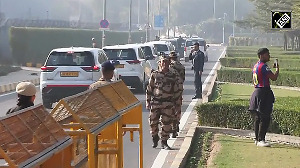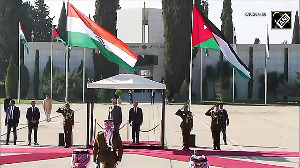India has "difficult choices" to make on the civilian nuclear cooperation agreement with the United States before the deal can be completed, United States Secretary of State Condoleezza Rice said.
The landmark accord, agreed in principle in July but still to be negotiated in detail, would grant New Delhi access to civilian nuclear technology it has been denied for three decades, provided it puts its civilian facilities under international inspections.
Senior-level talks in New Delhi last week failed to close the gap on major issues, including which Indian facilities would be designated as civilian and military. The military plants would still be off-limits to United Nations monitors.
"In order to move on to a new phase in which civil nuclear power would be available to India, India has to make some difficult choices," Rice said.
She refused to provide any details but insisted, "I think we're making progress." Although announced with great fanfare, the deal has run into criticism from nuclear experts and some members of the US Congress who say it undermines global non-proliferation goals.
A related issue is whether India will side with the United States when the International Atomic Energy Agency board of governors debates Iran's nuclear program at a February 2 meeting.
Washington and major European powers say Iran is developing a bomb and wants the case referred to the UN Security Council for possible sanctions. Tehran denies the charge and is fighting referral.
The US ambassador to India David Mulford said on Wednesday if India did not back the US position, the nuclear agreement could be in trouble.
The United States and India are trying to resolve differences before President George W Bush visits New Delhi in March.
The secretary of state did not speak directly of the Iran vote in the IAEA.
She said the nuclear agreement presented "a difficult set of issues". "But it's very important to understand that in order to satisfy the concerns of the American Congress and our laws and the concerns of the (44-nation) Nuclear Suppliers Group, that there will have to be some steps taken to make sure that the proliferation risks are not enhanced by this deal," she said.
Both the US Congress and the NSG, which sets rules for nuclear-related commerce, must approve the agreement.
For 30 years, the United States led the effort to deny India nuclear technology because it tested and developed nuclear weapons in contravention of international norms. Both India and its nuclear-armed neighbour Pakistan have refused to sign the nuclear Non-Proliferation Treaty.
President Bush now views India, a rising democratic and economic power on China's border, as an evolving US ally and the new nuclear deal -- allowing India to purchase nuclear reactors and fuel -- is central to that vision.





